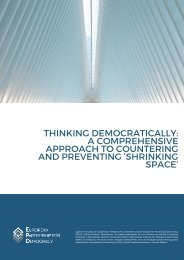Repression and resilience: Diagnosing closing space mid-pandemic
Create successful ePaper yourself
Turn your PDF publications into a flip-book with our unique Google optimized e-Paper software.
REPRESSION AND RESILIENCE: DIAGNOSING CLOSING SPACE MID-PANDEMIC<br />
7<br />
Introduction<br />
In the spring of 2020, many thous<strong>and</strong>s of people around<br />
the world faced the same dilemma: do I go out to join<br />
a protest? Or do I stay at home, out of fear for the<br />
potential health risks, criticism from fellow citizens <strong>and</strong><br />
government officials, <strong>and</strong> protest itself becoming an<br />
‘irresponsible’ act? This delicate balancing act, between<br />
exercising fundamental freedoms <strong>and</strong> preventing the<br />
spread of COVID-19, characterised both individual <strong>and</strong><br />
government decision-making during the p<strong>and</strong>emic.<br />
This resulted in broadly two kinds of government<br />
responses. In some countries, the p<strong>and</strong>emic presented<br />
the perfect opportunity for autocratising governments<br />
to legitimise the closure of democratic <strong>space</strong>, presenting<br />
the choice between freedoms <strong>and</strong> health as binary. Yet<br />
in many other countries, the restrictions on fundamental<br />
freedoms were mostly justified to limit the p<strong>and</strong>emic.<br />
In such cases, unjustified restrictions resulted from<br />
government uncertainty over the virus’ nature, rather<br />
than an active attempt to close democratic <strong>space</strong>.<br />
As the distinction blurred between attempts to limit<br />
democratic <strong>space</strong> <strong>and</strong> strategies to prevent infection, it<br />
became particularly difficult to assess to what extent the<br />
p<strong>and</strong>emic measures affected democratic <strong>space</strong> globally.<br />
As donors <strong>and</strong> policy-makers around the world are<br />
looking to support post-p<strong>and</strong>emic recovery in partner<br />
countries, it is essential to underst<strong>and</strong> how democratic<br />
<strong>space</strong> was affected by the p<strong>and</strong>emic <strong>and</strong> how p<strong>and</strong>emic<br />
recovery plans can contribute to strengthening <strong>and</strong><br />
exp<strong>and</strong>ing <strong>space</strong>.<br />
This study highlights the features <strong>and</strong> trends that marked<br />
democratic <strong>space</strong> developments during the COVID-19<br />
p<strong>and</strong>emic. It builds on nine case studies conducted over<br />
the course of July 2020 to December 2020, focusing on<br />
Burundi, Colombia, El Salvador, Guatemala, Honduras,<br />
Indonesia, Kenya, Ug<strong>and</strong>a <strong>and</strong> Venezuela. 1 This study<br />
also further develops a conceptual framework for<br />
underst<strong>and</strong>ing democratic <strong>space</strong>, initially developed<br />
in a previous study by the European Partnership<br />
for Democracy (EPD) <strong>and</strong> Netherl<strong>and</strong>s Institute for<br />
Multiparty Democracy (NIMD). 2 The new case studies<br />
provide an opportunity to refine the analytical framework<br />
<strong>and</strong> deepen our underst<strong>and</strong>ing of ‘democratic <strong>space</strong>’ -<br />
vis-à-vis the conceptual confusion <strong>and</strong> tensions with the<br />
term ‘civic <strong>space</strong>’.<br />
This paper first details the conceptual underst<strong>and</strong>ing of<br />
democratic <strong>space</strong> that underpins the research. The next<br />
chapter dives into structural trends in democratic <strong>space</strong><br />
during the p<strong>and</strong>emic. The paper then moves on to take<br />
a closer look at the actors that defended democratic<br />
<strong>space</strong> during the p<strong>and</strong>emic. In conclusion, the paper<br />
offers some overall reflections <strong>and</strong> recommendations on<br />
what the p<strong>and</strong>emic means for practitioners, the EU <strong>and</strong><br />
EU Member States’ policies <strong>and</strong> programming.<br />
1 5 of the case studies were updates to previously conducted case studies in 2017-2019, namely El Salvador, Guatemala, Honduras, Indonesia<br />
<strong>and</strong> Kenya. These countries were chosen for an updated case study due to their diversity in the kinds of attacks on democratic <strong>space</strong> <strong>and</strong><br />
their geographic spread. 4 other countries - Burundi, Ug<strong>and</strong>a, Venezuela <strong>and</strong> Colombia - were added because they have very different political<br />
constellations <strong>and</strong> thus provide insights from different contexts.<br />
2 European Partnership for Democracy & Netherl<strong>and</strong>s Institute for Multiparty Democracy (2020): Thinking democratically: A comprehensive<br />
approach to countering <strong>and</strong> preventing ‘shrinking’ <strong>space</strong>. Available here. The research was based on the following country case studies: El<br />
Salvador, Georgia, Guatemala, Honduras, Indonesia, Kenya, <strong>and</strong> Zimbabwe.

















